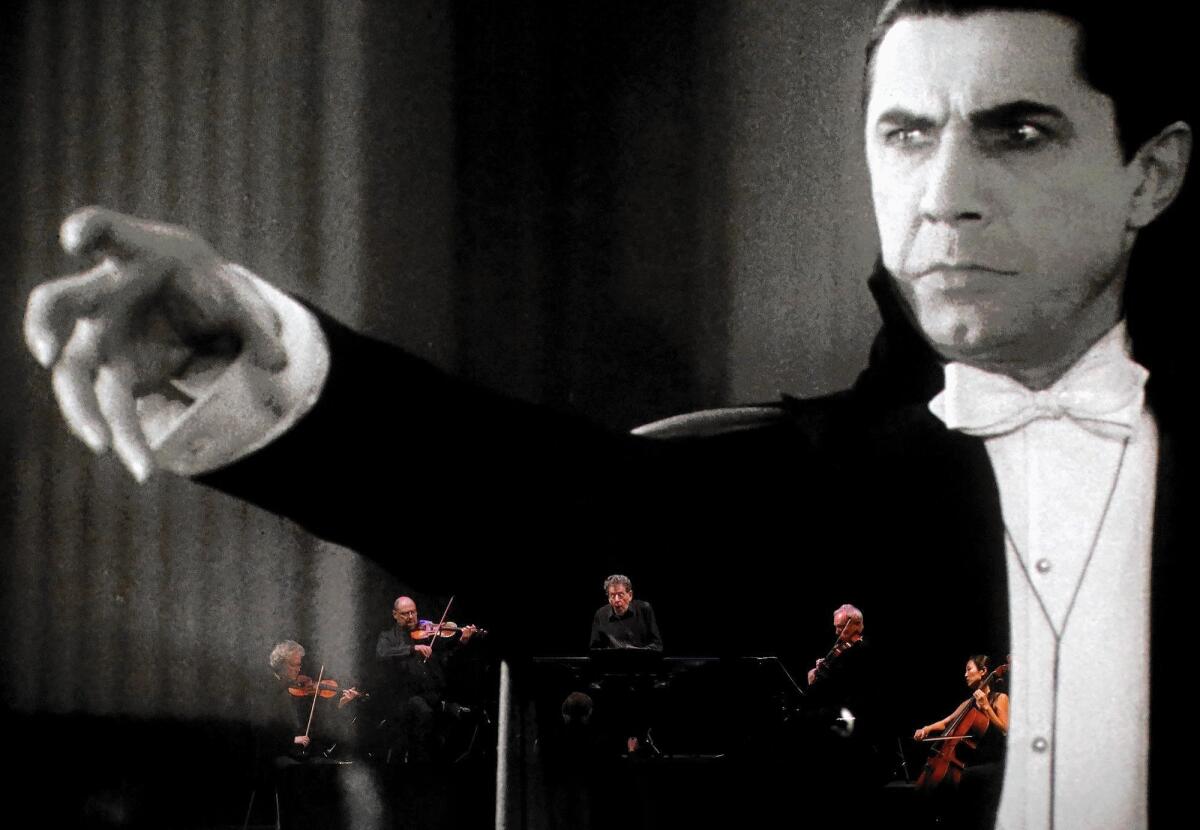‘Dracula’ meets Philip Glass and Kronos Quartet, and issues arise

- Share via
When something seems too good to be true, that may turn out to be the case. At least that was how it was for me when three things I ordinarily enjoy came together in a way that was more frustrating than fulfilling.
I’m talking about Friday night at downtown’s the Theatre at Ace Hotel, where Philip Glass and Kronos Quartet played Glass’ score to Tod Browning’s 1931 “Dracula” starring the inimitable Bela Lugosi. Having so many things to potentially enjoy made me almost dizzy in anticipation.
SIGN UP for the free Indie Focus movies newsletter >>
To begin with, I’m a major fan of the rehabilitation and reuse of old-school movie palaces, and the Theatre at Ace is one of Los Angeles’ grandest and most historic.
Built in 1927 as the flagship of the United Artists theater chain in a delirious style officially called Spanish Gothic, the 1,600-seat theater has had numerous incarnations since, including a stint as the headquarters of television evangelist Gene Scott.
The chance to see composer and pianist Glass play his own score accompanied by the venerable Kronos Quartet, titans of the serious music world, in an event prestigious enough to be part of Los Angeles Opera’s Off Grand series was also a lure.
And there was of course “Dracula,” along with “Frankenstein” and “The Mummy” one of the 1930s films that put Universal Studios on the horror map and both made the career of Bela Lugosi and locked him in a typecasting prison he could not escape.
I’d seen the film numerous times, but the chance to view it on a big screen with a full house and a Glass score (which was commissioned in 1999 for a Universal home video release) seemed too good to miss. Or so I thought.
At first all went well, as a crowd that defied all categorization poured into the Ace for one of four Los Angeles performances. Seeing grandparents with grandchildren, hipsters with and without tattoos, and just ordinary folks eager to watch an 80-plus-year-old film was a heartening experience.
Unfortunately, like many modern audiences, some of the crowd at the Ace treated “Dracula” not like a horror classic but rather an unintentional comedy. Yes, the film is of its time and place, with theatrical gestures and at times florid dialogue, but laughing at places that are not meant to be funny always feels like a regrettable reaction.
The opportunity for a new score exists because “Dracula,” made at a time when studios were experimenting with how to use sound, played in theaters with no specifically written music. Kronos attacked Glass’ work Friday night with propulsive verve, but problems surfaced at once when the music periodically made dialogue difficult to hear.
A bigger problem turned out to be presentation. Glass, the quartet and conductor Michael Riesman were placed behind the screen, sometimes invisible and sometimes illuminated by spotlights, leading to odd moments like a hand reaching out of a coffin and seemingly ready to pluck Kronos cellist Sunny Yang right out of her chair.
Even when none of the musicians was in immediate jeopardy, the lack of respect paid to the integrity of the image on the screen upset the purist in me, though it did lead me to consider the factors that have made “Dracula” the long-lived success it is.
Rooting around on YouTube for clips of the movie with its scoreless soundtrack reminded me how much director Browning had used silence as a tool in directing the film. The silence emphasizes the emptiness of Dracula’s lair, and when Lugosi’s resonant voice is added in, the effect is still chilling. Any music at all, even music with the Glass-Kronos pedigree, is going to be distracting.
As to the question of whether laughter is appropriate or not, I remembered the words of one of the film’s characters, a woman named Lucy Weston (Frances Dade), a bit infatuated with the count, who tells a friend, “Laugh all you like. I think he’s fascinating.” I do too.
Follow me on Twitter @KennethTuran
More to Read
Only good movies
Get the Indie Focus newsletter, Mark Olsen's weekly guide to the world of cinema.
You may occasionally receive promotional content from the Los Angeles Times.











